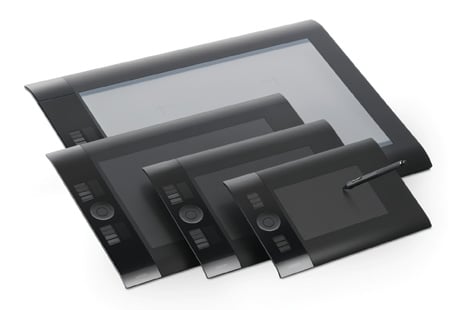 Once upon of time the Intuos line of drawing tablets from Wacom were designed for creative professionals but with the Intuos 4 line, I would go out on a limb and say it’s inclusive of everyone’s needs. Traditional artists who complained of pressure sensitivity (or lack there-of) will be happy to know it’s twice as sensitive so all the nuances from hand to paper (figuratively) are far more accurate and in real time.
Once upon of time the Intuos line of drawing tablets from Wacom were designed for creative professionals but with the Intuos 4 line, I would go out on a limb and say it’s inclusive of everyone’s needs. Traditional artists who complained of pressure sensitivity (or lack there-of) will be happy to know it’s twice as sensitive so all the nuances from hand to paper (figuratively) are far more accurate and in real time.Kudos to Wacom for the beautiful packaging. They probably wouldn’t admit it since there’s no loyalty to any particular platform but the boxing screams,
“Apple influenced me.” Everything is so thoughtfully laid out in a very slim box containing the tablet, mouse, pen, pen holder, USB cable, manuals, and software.
I have to give Wacom daps and a huge pat on the back for re-engineering every facet of the tablet. Ergonomics took a huge step forward with 4 sizes to choose from. It’s sleeker and looks far more sexier. They ExpressKeys are now grouped to one side which makes much more sense than the split layout of the Intuos 3. They’re also highlighted with OLED labels that rotate 180º automatically for ambidextrous use. The center ring, a.k.a Touch Ring, lets you zoom in/out of your canvas and change brush sizes with ease.
I received the medium sized tablet which has a 8.8″ x 10.0″ active area. The new designation maps better to widescreen displays and seems to be covered in a scratch resistant material. Installation was a breeze as with all Wacom products. You can even customize the Touch Ring and ExpressKeys. The cool thing is each tablet comes with a huge software bundle; Photoshop Elements, Sketchbook Express, Corel Painter Sketch Pad, and Color Efex Pro – an amazing Photoshop plugin for photographers. Trying purchasing those things separately and you’re looking at over $900+.
The pen, probably my most hated component from the Intuos 3 is so significantly improved, it’s difficult to know where to begin. It no longer feels like a cheap piece of plastic. It’s nicely weighted with a rubberized grip. There are multiple nibs to choose from conveniently stored inside the weighted pen holder. The pen feels great in my hand, coupled with the greater tablet sensitivity – drawing and photo editing feel much more natural. If you’ve used Intuos tablets before, pen functionality is still the same in regard to right/left clicks, contextual menus, click+drag, etc… and of course all customizable.
I’ve never been one to use the mouse which is great for 3D and CAD artists. The fit and finish are exceptional matching the pen. It still feels a bit too clicky for my liking but that’s subjective.
What it all comes down to is price and what you can get from another company. In recent years a number of manufactures have produced their own tablets at competitive price points. Unfortunately the Intuos 4 leaps frog them in terms of technical specs and price when you consider the bundled software. What Wacom has done is create a product for every price point. At the bottom end you have the Bamboo tablet which retails under $100. Is the mid-range you have the Intuos line which ranges from $230 – $790. The top tier is inhabited by the Cintiq line which pushes the $1k mark. With Wacom’s unparalleled support by Adobe, Autodesk, and Corel – it doesn’t make sense to buy anything but Wacom.
What we liked:
- Improved ergonomics, fit and finish
- Increased pen sensitivity (2,048 levels up from 1,024)
- ExpressKeys now all on one side
- Works for both right and left handed users
- ExpressKey buttons are soft but tactile
- Touch Ring makes scrolling long documents a breeze
- Pen actually feels like a durable product, weighted nicely
- Nifty pen holder keeps extra nibs neatly tucked away
- Priced nicely at $349 for the medium size
- Touch Ring should click when spun

No comments:
Post a Comment